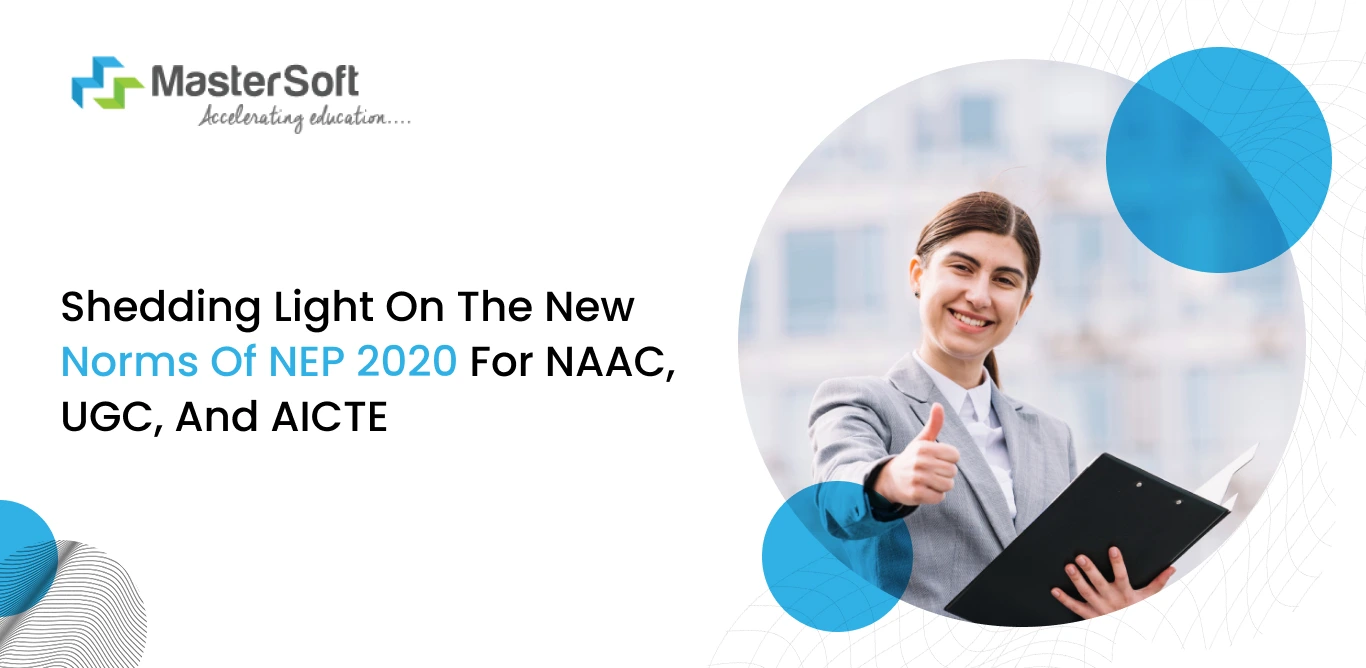Updated On | 18, November 2021
"Till date, we've been focusing on 'What to Think' in our education policy. In the NEP, we're focusing on 'How to Think'." - Shri Narendra Modi, Prime Minister, India
Reciprocating the vision of Narendra Modi, The National Education Policy 2020 is exactly what it takes to bring a massive change in the traditional system.
NEP has touched all the arenas of education and aims at delivering state-of-the-art education to empower students, faculty, educators, and ultimately – the nation!
One of the key transformations that NEP has brought is the introduction of a single authoring body that would take care of all the functions of higher education –HECI or the Higher Education Commission of India. You can say that it is a one-stop solution for all the needs of higher education institutions!
Under the vast umbrella of HECI, there will be various verticals that would look after accreditation, funding for institutions, and academics. The highly renowned autonomous entities like National Assessment and Accreditation Council (NAAC), University Grants Commission (UGC), and All India Council of Technical Education (AICTE) will no longer be in existence and will be swiftly replaced by these new bodies.
The primary goal is to make the work processes hassle-free, transparent, and highly effective.
Let’s understand the main responsibilities of the verticals under HECI...
Vertical 1: National Higher Education Regulatory Council (NHERC)
Until now, the UGC was majorly involved in the functioning of higher education institutions; NCTE was handling the teacher training & education department, and AICTE was assigned to technical and engineering institutes.
To ease & upgrade the traditional working pattern, the National Higher Education Regulatory Council (NHERC), the first vertical of HECI will now be the focal point of contact and address all the concerns related to these sections.
However, there’s an exception - NHERC won’t be responsible for legal & medical education.
Vertical 2: National Accreditation Council (NAC)
Accreditation helps in building the reputation of the HEIs and most importantly signifies the quality of education.
This is why most of the institutions pay special attention to getting accredited.
National Accreditation Council (NAC), the second authoring body under the HECI will replace popular accreditation bodies like the NAAC and perform the duty of accreditation institutions based on its merits.
Some of the key parameters it will strictly scrutinise include- good governance, basic norms of the institution, public self-disclosure, and most importantly the student learning outcomes ratio.
Only the institutions adhering to the quality parameters would be accredited successfully.
Following are the NEP 2020 guidelines for NAAC Accreditation
- For institutions and program grading, only BINARY accreditation (accredited, not accredited) has been recommended. This implies that there are only two options for a HEI's accreditation: accredited or not, with no grades involved. Thus, in future, grading may only be applicable to their programs.
- NEP 2020 promotes an outcome-based approach to education by emphasising skill development and employability. Institutions will be assessed by NAAC based on how well they are able to provide students with the necessary information, skills, and competences.
- It focuses on creating an environment for the Multiple-Accreditation-Agencies model to meet the institutions' rising needs. There is now only one national agency responsible for accrediting the thousands of colleges throughout the nation. The NEP 2020 also plans to set up a ‘meta-accrediting body’ called the National Accreditation Council (NAC), hence NAAC will become NAC.
- The formation of an Accreditation Advisory Council and the Single-Umbrella implementation model are both proposed.
- The borders between the arts, sciences, and humanities are blurred by the NEP 2020's promotion of collaboration between disciplines. Institutions' efforts to provide interdisciplinary research opportunities and promote multidisciplinary programmes will be evaluated by NAAC.
- The NEP 2020 and Sustainable Development Goals (SDGs) 2030, particularly SDG 4 for education, must be integrated into the System of Assessment and Accreditation (SAA).
- Real-time, technology-enabled formative evaluation is advised. additionally uses technology to gather the necessary data in order to make informed assessment and accreditation decisions.
- NEP 2020 acknowledges the need for digital education given the rapid growth of technology. NAAC will ensure efficient online teaching and learning techniques by assessing institutions' ability to utilise digital tools and platforms.
- The emphasis of the evaluation criteria is on general education, skills and competencies for specialised education, and research and innovation contributions. The NBA does not cover all programs, and this gap needs to be filled in as soon as possible.
- NAAC's functions include accreditation; assessment; quality maintenance,and improvement.
- According to NEP 2020, universities would be given greater autonomy. NAAC will place a focus on institutions' ability to analyse their own performance and constantly improve through self-assessment processes.
- For HEIs, NEP suggests outcome-based Assessment and Accreditation (binary), and assessment-based Grading for their programs.
- The current assumption is that once the systems and processes required for achieving them are in place, the desired learning outcomes can be accomplished. The assumption needs to be reexamined, and the emphasis should instead be placed on evaluating the learning outcomes that HEIs are expected to accomplish.
What Is Summative Assessment? Examples And Types Of Summative Assessment
Vertical 2: National Accreditation Council (NAC)
Accreditation helps in building reputation of the HEIs and most importantly signifies the quality of education.
This is why most of the institutions pay special attention to getting accredited.
National Accreditation Council (NAC), the second authoring body under the HECI will replace popular accreditation bodies like the NAAC and perform the duty of accreditation institutions based on its merits.
Some of the key parameters it will strictly scrutinize include- good governance, basic norms of the institution, public self-disclosure, and most importantly the student learning outcomes ratio.
Only the institutions adhering to the quality parameters would be accredited successfully.
Vertical 3: Higher Education Grants Council (HEGC)
Funding and financing are vital for institutions to work smoothly.
Higher Education Grants Council (HEGC), the third vertical under HECI will facilitate financing & funding to genuinely deserving institutions maintaining transparency to ensure fair practices.
Vertical 4: General Education Council (GEC)
To persuade greater student learning outcomes via best educational delivery- General Education Council (GEC), the fourth vertical under HECI will take the charge.
It will form a thoughtful criterion and decide the expected student learning outcomes for various institutions. Along with that, the GEC will also be responsible for creating - National Higher Education Qualification Framework (NHEQF).
Various professional councils listed below will act as the PSSB - Professional Standard Setting Bodies–
- Council of Architecture (CoA)
- National Council for Vocational Education & Training (NCVET)
- Veterinary Council of India (VCI)
- National Council for Teacher Education (NCTE)
- Indian Council for Agricultural Research (ICAR)
ICT for Higher Education
To ensure efficiency and transparency of work, and clear communication between officials, HECI will focus on the enhanced use of technology. The Government officials are also encouraging institutions to switch to automation and edTech for seamless online-teaching experience.
For more details on the role of ICT in education and detailed discussion on National Education Policy 2020 for higher education, you can refer to one of our previous blogs.
And for further assistance on implementation of university ERP or college ERP software, get in touch with us!
Disclaimer
This publication, and the contents herein, introduces overall features of the Accreditation Data Management System developed and owned by the MasterSoft ERP Solutions Private Limited, however, the access to the same shall be limited to the features opted by its Users. It shall be understood that the System shall be modified from time to time by the MasterSoft ERP Solutions Private Limited as and when found necessary, and such modifications shall be made available, automatically and mandatorily, to the Users.
The Accreditation Data Management System allows the Institutes to assimilate Campus Data in one Central Database, and generates various Reports that may be helpful in the accreditation process. However, it does not calculate/estimate/speculate the accreditation or ranking scores, and it shall not be implied in any manner that we claim to improve the accreditation score or ranking of the Institutes.
MasterSoft ERP Solutions Private Limited is not associated with the NAAC, and no part of the contents published herein intend to imply the same. Any part of such contents, if found to be similar to or suggestive towards the material featured on the official Website of the NAAC, is to be treated as having been sourced from the said Website; and MasterSoft ERP Solutions Private Limited claims no ownership or interest over the said information.
We declare that every such information is published in consonance with the Copyright Policy of the NAAC as stipulated on its official Website, and that we have no intention to dilute the accuracy of or to derogate the said material. We also affirm that no part of the contents published herein infringe Copyright(s) of any third party(ies).
We urge all the readers of our publications to honour the esteem of NAAC, and the sacrosanct information published by it in public interest.









